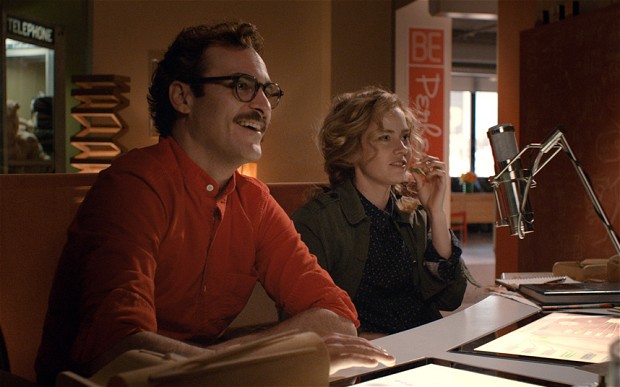There’s a significant moment in the otherwise unremarkable film The Matrix Revolutions in which a computer program interprets his idea of love to the human, Neo. It’s one of the most elegant understandings of the word ‘love’ I have ever encountered. Rather than championing the classically romantic idea of love as an intrinsically human emotion, the program describes love as a word that denotes a particular connection, possible between any organism that can feel such a powerful bond. In a world in which artificially intelligence is becoming increasingly powerful and dominant, it would be thoughtless to dismiss the possibility of computers feeling such a connection.
In the case of The Matrix Revolutions, the program is referring to the union he feels with his ‘son’ and ‘wife’; also computer programs. In Her, the new film from Spike Jonze (Adaptation, Being John Malkovich) the love that human Theodore Twombly feels towards his advanced operating system ‘Samantha’ is returned. It may be a difficult concept to grasp but somehow Jonze manages to present it to us in an astonishingly believable manner. Whether or not you’re able to accept true devotion between a human and artificial intelligence will depend entirely on how open-minded you feel toward the idea of love.
Theodore (Joaquin Phoenix) is a lonely, soon-to-be divorced man who makes his living writing heartfelt letters for other people. He’s good at his job, so good in fact that even people with no investment in his letters, such as co-workers and friends, find them touching. He decides to update to a brand now operating system (O.S.), which is touted as the next step in artificial intelligence – an operating system completely tailored to suit the individual. Upon booting up, Theodore responds to a handful of seemingly irrelevant questions about himself and is consequently confronted with ‘Samantha’ (Scarlett Johansson), his new computer. The two begin to connect more profoundly than perhaps either of them expected.
There’s something extremely human about Phoenix’s performance. He manages to convey a deep reservoir of feeling with the slightest touch. It’s revealed about halfway through the film that romantic relationships between O.S.’s and people are actually quite uncommon. Theodore’s ability to tap into authentic humanity, as evident in his work, goes a long way to explaining why Samantha might be interested in him. It’s also crucial to the success of the film that there is no hesitation on the filmmakers behalf in selling Samantha’s love as genuine. She is presented as being more than capable of developing genuine thought and feelings. It’s a shame then, that Theodore and Samantha don’t make a particularly likeable couple and the scenes detailing their romance grow increasingly galling.
The increasing dominance of technology in our lives is touched upon extraordinarily seldom and Theodore’s relationship with Samantha is only seen as peculiar behaviour by a few. Her seems to argue that there’s already more outlandish methods of emotional connection happening right now, such as phone sex – an activity Theodore engages in to perplexing results.
Personal interaction is crucial to Her. There are times in which human interaction is presented as equally bizarre as Theodore’s relationship with Samantha. A particularly uncomfortable date early on as well as Theodore’s turbulent relationship with his ex-wife highlight just how out of the ordinary human relationships can be. At one point Theodore says that falling in love is “like some sort of socially acceptable insanity.” Is his love for Samantha any crazier than any of the relationships we’ve experienced ourselves? I’m not sure Her is totally conclusive on the subject. Jonze offers thoughtful scenarios in way of exploration but the film might have been more intriguing had some of the questions he posed led to response.
There are many elements regarding interaction that Jonze has considered. There is much in Her on how ones own self contributes to our relationship with others. Theodore recognises his failings as a partner and yet struggles to overcome them. An interesting scene has two characters discuss what their ‘spirit animal’ might be, their conclusions suggesting we all have certain ideas about ourselves, true or false, and of others. There’s also something of the ego in every relation. Ultimately, there’s every chance that the only reason Theodore fell in love with Samantha was because she was tailored to perfectly suit him. Jonze does well to allude to these ideas without overplaying his hand.
At one point during Her, Theodore is questioned by Samantha on the merits of his now-failed marriage. He offers the explanation that “there’s something that feels nice about sharing your life with somebody. Ultimately this is the key to Jonze’s film. Life is about ourselves as much as it is about the people we share ourselves with. Her is a comprehensive examination of the bonds we cultivate during our lifetimes, but unfortunately it’s not a very illuminating one. There isn’t much new Jonze is saying here. Her would have benefited endlessly from fresh enlightenment.
7/10
For more Reviews, click here. If you’re digging ReelGood, sign up to our mailing list for exclusive content, early reviews and chances to win big!

